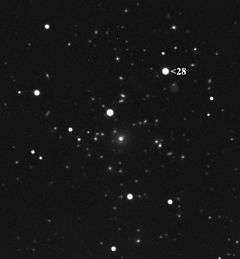28 Bellona
|
| |
| Discovery | |
|---|---|
| Discovered by | R. Luther |
| Discovery date | March 1, 1854 |
| Designations | |
| Pronunciation | /bɛˈloʊnə/ be-LOH-nə |
| 1951 CC2 | |
| Main belt | |
| Orbital characteristics | |
| Epoch Sept 30, 2012 (JD 2456200.5) | |
| Aphelion | 477.240 Gm (3.196 AU) |
| Perihelion | 353.977 Gm (2.358 AU) |
| 415.608 Gm (2.777 AU) | |
| Eccentricity | 0.151 |
| 1690.19 d (4.63 a) | |
Average orbital speed | 17.77 km/s |
| 121.574° | |
| Inclination | 9.430° |
| 144.330° | |
| 344.461° | |
| Physical characteristics | |
| Dimensions |
97 ± 11 km[2] 120.9 ± 3.4 km (IRAS)[3] 108.10 ± 11.49 km[4] |
| Mass | (2.62 ± 0.15) × 1018 kg[4] |
Mean density | 3.95 ± 1.28 g/cm3[4] |
| 0.0338? m/s² | |
| 0.0639? km/s | |
| 15.706 h[3][5] | |
| Albedo | 0.1763[3][6] |
| Temperature | ~163 K |
Spectral type | S[3] |
| 7.09[3] | |
|
| |
28 Bellona is a large main-belt asteroid. It was discovered by R. Luther on March 1, 1854, and named after Bellōna, the Roman goddess of war; the name was chosen to mark the beginning of the Crimean War.
Bellona has been studied by radar.[7] Photometric observations of this asteroid at the Palmer Divide Observatory in Colorado Springs, Colorado in 2007 gave a light curve with a period of 15.707 ± 0.002 hours and a brightness variation of 0.27 ± 0.03 in magnitude. This report is in close agreement with a period estimate of 15.695 hours reported in 1983, and rejects a longer period of 16.523 hours reported in 1979.[8]
References
- ↑ "Astrometry.net job 1005148". Astrometry.net. Retrieved 6 February 2015.
- ↑ Ďurech, Josef; Kaasalainen, Mikko; Herald, David; Dunham, David; Timerson, Brad; Hanuš, Josef; et al. (2011). "Combining asteroid models derived by lightcurve inversion with asteroidal occultation silhouettes" (PDF). Icarus. 214 (2): 652–670. arXiv:1104.4227
 . Bibcode:2011Icar..214..652D. doi:10.1016/j.icarus.2011.03.016.
. Bibcode:2011Icar..214..652D. doi:10.1016/j.icarus.2011.03.016. - 1 2 3 4 5 "JPL Small-Body Database Browser: 28 Bellona". Jet Propulsion Laboratory. Retrieved 2012-01-28.
2012-01-02 last obs
- 1 2 3 Carry, B. (December 2012), "Density of asteroids", Planetary and Space Science, 73, pp. 98–118, arXiv:1203.4336
 , Bibcode:2012P&SS...73...98C, doi:10.1016/j.pss.2012.03.009. See Table 1.
, Bibcode:2012P&SS...73...98C, doi:10.1016/j.pss.2012.03.009. See Table 1. - ↑ http://www.psi.edu/pds/asteroid/EAR_A_5_DDR_DERIVED_LIGHTCURVE_V8_0/data/lc.tab
- ↑ http://www.psi.edu/pds/asteroid/EAR_A_5_DDR_ALBEDOS_V1_1/data/albedos.tab
- ↑ "Radar-Detected Asteroids and Comets". NASA/JPL Asteroid Radar Research. Retrieved 2011-10-30.
- ↑ Warner, Brian D. (December 2007), "Asteroid Lightcurve Analysis at the Palmer Divide Observatory - March-May 2007", The Minor Planet Bulletin, 34 (4), pp. 104–107, Bibcode:2007MPBu...34..104W.
External links
- JPL Ephemeris
- "Elements and Ephemeris for (28) Bellona". Minor Planet Center.
- 28 Bellona at the JPL Small-Body Database

This article is issued from Wikipedia - version of the 9/10/2016. The text is available under the Creative Commons Attribution/Share Alike but additional terms may apply for the media files.
